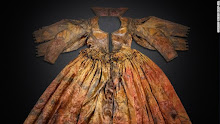Continuing our "month of love" celebration (and upcoming marriage of Prince Harry and Meghan Markle) with the second part of “The Woman I Love” (excerpt from my book in progress)...and featuring a number of Windsors!
........................................................
The Woman I Love
{part two of three*}
Nonetheless, change always happens.
Almost seven decades after King Edward’s abdication, a change in social culture
was on Charles’ side (thanks in great part to the work of his late wife.) In
2005, 24 years after his marriage of “duty,” Charles did not have to give up the
throne (although there were restrictive provisions), nor start a palace
revolution nor send anyone to the guillotine, yet he indeed married the woman
who had been his longtime friend and confidante—the woman he had long
loved—Camilla Shand Parker Bowles; now Camilla, Duchess of Cornwall. And they
are a couple who seem to simply fit so well together. “What your heart thinks is great, is great,” nineteenth century American
poet Ralph Waldo Emerson said. “The soul’s emphasis is always right.”
By her uncle choosing this path not
only changed his niece Elizabeth’s life path, but set (or perhaps re-set) her
on an extremely duty-bound course, declaring “duty” as the center of “the
inspiring exemplar of ideal family life,” wrote Howard Chua-Eoan in Time magazine in 2007. She put the whole
Windsor clan to work in a regular, day-to-day, dutiful plan of action.
“Elizabeth would serve. She would persevere. She would be dutiful. She would
obey.” And with such focus, maybe she missed the emotional shifts her people
were going through when Diana came on the scene in the 1980s and 90s; cultural
changes that Diana—“the girl chosen to refresh the line, to bear its heirs, to
be the new smiling face of the family”—recognized, related and responded to,
and called out the monarchy for ignoring. Yet no matter how Queen Elizabeth had
carefully and dutifully constructed this façade that she believed to be true
and honest, “Diana found the dynasty dysfunctional, uncertain of its work, in
truth more a firm than a family,” Chua-Eoan added. “Diana tried to serve, she
tried to persevere. She tried to be dutiful. But in the end, she would not
obey.” Nor had King Edward. Perhaps the world was not ready for a king to
“bring his heart” to the throne, but Princess Diana later got the world’s
attention by revealing what happens in a family not allowed to bring its heart
along with them. (It occurs to me the Windsor family’s sacrificial trade-off
for being immensely rich and privileged was to do your duty and happiness be
damned. That was certainly the royal culture in which both David—King
Edward—and Prince Charles grew up.)
[To Be Continued...]
{*Part two of three from "The Woman I Love"....excerpt from my book in progress, tentatively titled, A Memory of Love: The Spiritual Mission of a Princess.}
[To Be Continued...]
{*Part two of three from "The Woman I Love"....excerpt from my book in progress, tentatively titled, A Memory of Love: The Spiritual Mission of a Princess.}





















No comments:
Post a Comment